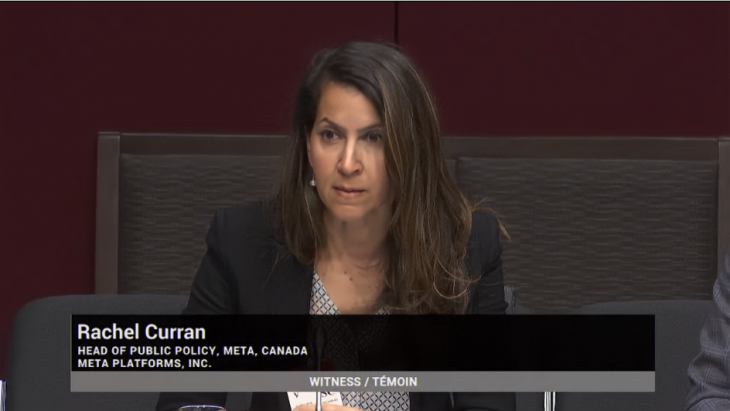
By Christopher Guly
OTTAWA – Meta and Google threatened to withdraw news articles from their platforms should bill C-18 become law, company executives told members of the Standing Senate Committee on Transport and Communications Wednesday evening.
The framework of the Online News Act that passed second reading in the Senate last month requires platforms to compensate news publishers for linking to their articles.
“[This] is quite frankly, Senators, unworkable for us,” said Rachel Curran, the Ottawa-based head of public policy in Canada for Meta, parent company of Facebook, in its first appearance before a parliamentary committee on C-18.
She said that Canadian Heritage Minister Pablo Rodriguez has told platforms how they “choose to comply with the Online News Act is a business decision we must make, and we’ve made our choice.”
“Because the legislation ignores the realities of how our platforms work, the preferences of people who use them and the value we provide news publishers, we have no choice but to comply with it by ending the availability of news content if Canada if C-18 is passed as drafted,” said Curran, a lawyer by training, who served as director of policy for former Conservative prime minister Stephen Harper.
She said that the Online News Act is based on “a false premise” and “fundamentally misunderstand[s] the true relationship between platforms and publishers.”
“It is publishers that benefit from being on our platforms, not the reverse,” said Curran, who noted that over the past year, Facebook feeds sent Canadian news publishers over 1.9 billion clicks worth an estimated $230 million in free marketing.
“News content is also not a significant source of revenue for Meta,” she added. “Posts linking to news articles make up less than 3 per cent of what people see in their Facebook feed.”
Curran said that the public-policy debate regarding C-18 is “intertwined with concerns about the role of journalism in civic society, and we agree that news holds tremendous social value.”
“But this bill misrepresents the economic value of news to our company and it risks further subsidizing large legacy organizations and profitable broadcasters at the expense of independent and innovative news businesses,” she said.
Richard Gingras, Google’s vice president of news, said that “creating clear exemption criteria would have the immediate benefit of encouraging Google and publishers to sit down, reach agreements and flow money to journalism quickly.”
“Replacing final-offer arbitration with standard commercial arbitration – which is relied on for the most complex business disputes – would be the fair and just way to settle any resulting disputes.”
He said that furthermore, “clarifying eligibility criteria would ensure the bill effectively and equitably supports quality journalism for local communities, including ensuring that eligible news businesses actually produce journalism and directly fund the creation of journalism.”
Gingras – past publisher of Salon.com, the first online-only publication – said that the “reality of C-18 is that the extreme level of business uncertainty and uncapped financial liability that Google is being asked to accept, merely for providing free links to the news sources Canadians are searching for and which news publishers benefit from, is unreasonable and threatens to create a situation where everyone loses.”
He said that if Google is compelled to pay media organizations “simply for linking to their sites, making us lose money with every click, it would be reasonable for us, or any business, to reconsider why we would continue to do so,” adding that at a minimum, C-18 “should include a clear and attainable path to exemption that incentivizes businesses like Google to continue to support the Canadian news ecosystem.”
Meanwhile in California on Tuesday, the Journalism Preservation Act – which would require such platforms as Meta and Google to share with “eligible digital journalism provider[s]” a percentage of their monthly advertising revenue, as determined through an arbitration process – received bipartisan support from the State Assembly Judiciary Committee, as it proceeds to a June 2 deadline for consideration by the lower house of California’s legislature.


